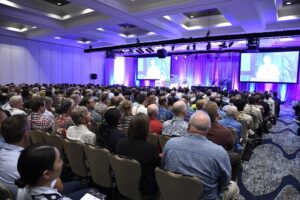
Over 840 attendees from 23 countries, including USA, attended the 2018 AMOS Conference.
The 19th annual Advanced Maui Optical and Space Surveillance Technologies Conference (AMOS), held on September 11-14, 2018 at the Wailea Beach Resort-Marriott, was the largest in its history. Organized and presented by Maui Economic Development Board (MEDB), AMOS brought together representatives from government, industry, and academia to discuss the rapid changes in the field of Space Situational Awareness (SSA) and Space Traffic Management (STM).
Over 840 attendees representing 23 countries participated in the strong technical program. Keynote speakers, panel discussions, exhibits and poster presentations addressed the growing number of space operators, the move to commercial activities, and the importance of balancing commercial innovation with national security and international relations.
The continued growth in attendance and participating countries at AMOS reflects a growing interest in SSA as new actors—national governments, start-up companies, universities, and non-governmental organizations—become more involved in space activities. The main theme of this year’s SSA Policy Forum was the implications of STM and commercialization in space, including national security, policy challenges, and the regulatory rules needed to ensure safe access to space, safe operation in space, and safe return from space.
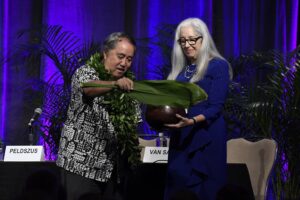
The 2018 AMOS Conference opens with a blessing.
“The 2018 AMOS Conference helped to lead the space community towards a more inclusive world,” said Leslie Wilkins, MEDB President and CEO. “The program successfully wove together strands of policy panels and technical presentations, fostering an understanding of the interconnection between the two perspectives.”
The conference attracted a record number of 219 paper submissions that were reviewed and sorted into more than 60 oral presentations and approximately 80 poster presentations. The papers offered updates and assessments of current research and cutting-edge technology in the fields of astrodynamics, orbital debris, adaptive optics and imaging, optical systems and instrumentation, and non-resolved object characterization.
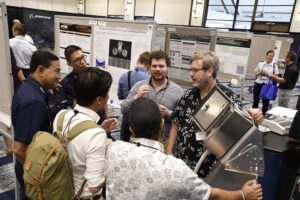
28 Exhibitors and 80 Poster Presentations over the 3 day AMOS Conference.
AMOS had 39 corporate and organizational sponsors and 28 exhibitors. Numerica Corporation, having participated as a presenter and attendee at AMOS for the past decade, was a sponsor and exhibitor for the first time at this year’s conference, introducing their commercial SSA capabilities to the space community.
Dr. Jeff Aristoff, Numerica Program Director, said, “Numerica has enjoyed much support from numerous world-class researchers over the years. The company is committed to ‘pay it forward’ to the research community by providing no-cost access to a stream of precision SSA data on a subset of the objects that Numerica is tracking.”
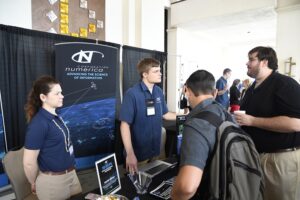 Aristoff added, “Even in the fast-paced market of commercial SSA, Numerica is moving rapidly to deploy a number of key technologies that will further enhance our customers’ SSA and space control activities.”
Aristoff added, “Even in the fast-paced market of commercial SSA, Numerica is moving rapidly to deploy a number of key technologies that will further enhance our customers’ SSA and space control activities.”
Michael Czajkowski, Lead Member, Engineering Staff, Lockheed Martin Advanced Technology Laboratories and AMOS attendee, said, “Attending AMOS showed me the importance of all the different tradecraft needed to go into remotely sensed data. Therefore, I see an opportunity here to build cross-functional teams with expertise in astrophysics, data science, and software engineering to develop mathematical models, analyze complex data sets, and deploy advanced systems that detect and classify anomalies at machine speed.”
Czajkowski concluded, “The conference keynote speakers, panel discussions, poster and exhibiters, as well as the short courses, showed new ways we capture data from sensors as they become prolific through commercialization. These modalities could help us to look beyond kinematics to understand behaviors of resident space objects by examining patterns and helping determine what is normal and what isn’t.”
New to the Conference
New to the conference this year, the Journal of the Astronautical Sciences, an archival publication devoted to the technology of space flight, will publish significant technical papers presented at AMOS. Additionally, this year the American Astronautical Society Space Surveillance Technical Committee presented awards for Best Paper and Best Student Paper.
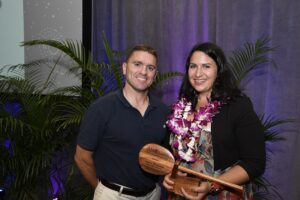
Laura Pirovano accepts her awards for Best Paper and Best Student Paper from Award Committee member, Lauchie Scott.
Laura Pirovano, a PhD student at the University of Surrey in Guildford, United Kingdom, was the recipient of the 2018 AMOS Best Student Paper award. Pirovano’s paper deals with “Probabilistic Data Association Based on Intersection of Orbit Sets”. Her winning paper incorporated differential algebra to perform initial orbit determination problems without the use of physical constraints, a highly innovative and efficient approach to this very complex problem. In a surprise move, the Committee also awarded Best Paper to Pirovano, another indication of the outstanding quality of her work.
SSA POLICY FORUM
The SSA Policy Forum explored international issues related to SSA, in panel format. Held each morning during the conference, each policy session was introduced by a relevant keynote speech by an invited SSA thought-leader. Bringing together the developers and implementers of SSA capabilities with the architects of SSA policy, provided a forum to interact at a time when the economic and operational environments are rapidly changing.
Day 1: SSA and Enhancing Security and Deterrence
Many countries, including the U.S., have growing concerns about the proliferation of counter-space capabilities and the possibility of future conflicts on Earth extending into space. This panel discussed the role SSA plays in enhancing national and international space security and deterrence, and steps that can be taken to strengthen the ability to deter aggressive action against satellites and ensure a stable, predictable space domain.
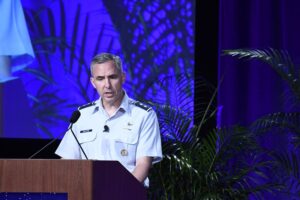
Major Gen Stephen Whiting presented the Opening Keynote Address.
The keynote was delivered by Major General Stephen Whiting, Commander, 14th Air Force, Air Force Space Command, and Deputy Joint Force Space Component Commander, U.S. Strategic Command, Vandenberg Air Force Base, California.
“Superiority over any domain is not a birthright,” said Whiting. “Every country must earn it and constantly evolve to maintain it. SSA supports our ability to rapidly warn and defend our vital space systems. We work with our allies and stand with our partners, with the goal of integrating their capabilities with ours for global safety.”
Whiting went on to applaud the experts at the AMOS Conference for their expertise in the field of SSA and the importance of their contributions. “Industry can innovate without permission,” he said. “Turn your sensors to the sky and discover new problems. Isolate them and solve them individually and use what you learn to help us preserve peace in the space domain.”
Day 1 Panel Moderator: Doug Loverro, Former Deputy Assistant Secretary of Defense for Space Policy, U.S. Department of Defense.
Panel Members: Regina Peldszus, Aerospace Center; Jana Robinson, Prague Security Studies Institute; Scotty Van Sant, U.S. Strategic Command.
“There needs to be a lot of work done in how we handle data.” said Loverro. “I’m excited for the opportunity for a consortium to work together as partners to shape standards for SSA, which can help with deference. As General Whiting elaborated, ‘We need to de-centralize thinking about space the same way we have de-centralized thinking about land and sea’. The reality is that the DoD needs to interface with industry and academia to unite responsible actors and attract business while keeping the U. S. safe. Space has become a potential market for commercial opportunities, a driven innovation worldwide. However, it’s also raised questions about national security and policy.”
Peldszus said, “The transfer of good practice in space is key, how to share technical data and its impact on capabilities. Issues of high-reliability and safety-critical domains must be fostered through policy, and governance of complex large-scale socio-technical systems including multilateral infrastructure, resilience and operational practice in critical and routine scenarios. We are currently debating how serious Europe is about global sharing of SSA.”
Robinson’s work in “Space Security in Bilateral International Relations” introduces how the changing space environment influences international space-related cooperation. She said, “It is important to review the role of China’s and Russia’s initiatives in international organizations relevant to space. It is also important to present the main elements of the EU’s international engagement with respect to space security issues.”
Van Sant added, “We must have an open exchange of data to detect objects in space for long-term safety in the space environment and for international confidence in the domain. An SSA sharing program is a stepping stone to building partnerships. We must explore mutual opportunities, growing liaisons with other nations to integrate into CSpOC (Combined Space Operations Center). Governance is important. Yet, how do we define space stability and what bad behavior looks like? The U.S. is committed to stability with allies to deter threats and conflicts extending into space.”
Day 2: STM and Modernizing Oversight of Commercial Space Activities
As the number and complexity of human space activities grows across commercial, civil, and national security sectors, space traffic management (STM) includes civil aspects of space situational awareness, government oversight of private sector activities, and managing the space environment. The United States recently issued a new presidential policy directive establishing a national space policy and an administrative framework for implementation. Other countries are also reconsidering their own national policies and capabilities. The Day2 panel discussed the evolution of STM, the potential roles of government and the private sector in its implementation, and international cooperation.
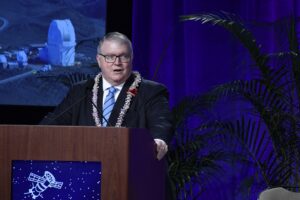
Kevin O’Connell addressed the AMOS Conference on Day 2.
The keynote speaker was Kevin O’Connell, Director of the Office of Space Commerce, U.S. Department of Commerce.
“My office is a ‘one-stop shop’ for policy and regulatory matters, plus we advocate for commercial industry, “said O’Connell. “Beyond the re-establishment of the National Space Council, and its early Space Policy Directives, this is another reflection of the Trump Administration’s emphasis on space, and specifically U.S. commercial space as an important source of innovation and economic benefit to the nation.”
O’Connell explained “U.S. commercial enterprises will play a key role in transforming our SSA and STM capabilities because of the confluence of national leadership, technology, and finance that is driving space innovation very quickly. Most importantly, the need to understand activity in space is growing every day, based on U.S. strategic and economic interests.”
“The high-speed growth of the global space economy will depend on the rapid modernization and improvement of the SSA and STM missions as they exist today,” O’Connell stressed to the audience. “The key question is how quickly and efficiently we can involve industry in this transformation. We have brought together the many agencies of Commerce to address this.”
In closing, O’Connell said, “I believe we are at the beginning of a new age in SSA and STM, one that will be absolutely essential to the space economy and for space exploration to the Moon and beyond. Those goals cannot be reached without the robust participation of all sectors in the space industry. The Department of Commerce and other U.S. government agencies are working intensely to find new pathways for that to happen.”
Day 2 Panel Moderator: Ralph Dinsley, Northern Space and Security
Panel Members: Bhavya Lai, Science and Technology Policy Institute, Institute for Defense Analyses; Bryan Benedict, SES Government Solutions; Paul Graziani, Analytical Graphics Inc.; John Kay, Defence Technology Agency, New Zealand Defence Force; and Charity Weeden, U.S Managing Representative, Astroscale, Lquinox Consulting, LLC.
Dinsley said, “With the defense industry becoming ever more data driven, ensuring that space systems can operate safely and efficiently is crucial for government and military agencies. We need to discuss approaches and strategies for how a holistic approach to SSA can be successfully implemented at a time when the domain is growing increasingly congested with active satellites as well as space debris.”
“In addition,” Dinsley continued, “with plans for satellite launches and Low Earth Orbit mega-constellations increasing at an alarming rate, the issue of space governance in this ill-defined domain requires immediate consideration to ensure that necessary safe and responsible space exploitation can continue for years to come.”
Lai said, “We did a study on Global Trends in SSA and STM. Our case studies showed that increasingly there is an expectation on the part of operators, including foreign governments as well as private operators, that the SSA information they receive be more precise and transparent than it is today. However, given the growing importance of space in countries around the world, and the prospect of profiting from providing this information, there is growing global and private interest in both providing and using SSA information.”
“There is tremendous advancement happening with new systems,” added Graziani. “We need to work on the complex issue of how to share data for collision avoidance and safety of flight without disclosing sensitive information.”
Charity Weeden talked about how to mitigate debris from end-of-life satellites, how active debris removal is key, and how international collaboration is needed for the task. She said, “We all need to share the responsibility for defunct satellites doing harm in the space neighborhood. Thousands of new satellites are predicted to be launched and we need a plan to de-orbit them. Our mission is to reduce the amount of space debris and keep Earth orbit sustainable and usable for generations to come by developing technology to remove broken satellites and large pieces of junk.”
Day 3: SSA to Support Best Practices for Rendezvous and Proximity Operations (RPOs)
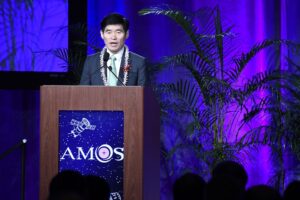
Sei-Joong Kwon from Republic of Korea was one of two keynote speakers on the final day of the 2018 AMOS Conference.
Two different keynote speakers addressed this session. Sei-Joong Kwon, Director General for Climate Change, Energy, Environment and Scientific Affairs, Ministry of Foreign Affairs, Republic of Korea, emphasized bilateral cooperation. He said, “Our cooperation is strengthening between the U.S. and Republic of Korea. Our partnership is focused on national policies, regional issues, and areas of mutual cooperation.”
Kwon added, “As President Trump highlighted in his visit to the Republic of Korea in November 2017, the U.S. and Republic of Korea alliance remains a linchpin for security, stability, and prosperity in the Indo-Pacific. Today’s dialogue builds on that vision and the strong bilateral cooperation that serves as a foundation for our solid alliance.”
Richard H. Buenneke, Senior Advisor, Space Policy, U.S. Department of State, emphasized the complexities and open issues related to space operations. RPOs are a fundamental component of many future space technologies, including satellite inspection and servicing, on-orbit assembly, and active debris removal. However, the spread of RPO technology and activities on orbit has also created increased concerns about the ability to carry out such activities in a safe and responsible manner and about national security implications.
Buenneke said, “Although a nation’s interest in protecting its commercial assets in space would seem obvious, the task of protecting commercial satellites is inherently complicated. As more countries start to branch out into space, controlling traffic and keeping an eye on satellites and debris is of growing interest to many governments. Protection requires coordination among multiple actors in the public and private sectors. Given the complexities of the process, it is not surprising that efforts to protect all stakeholders are slow in coming. At the same time, it is key to provide increased assurance of safety standards, thus benefiting the economic and national security interest of America, its allies and its commercial partners.”
Day 3 Panel Moderator: Victoria Samson, Secure World Foundation.
Panel Members: Jim Armor, OrbitalATK; Lt. Col. Kevin Amsden, Air Force Space Command; Tom Kubancik, L3 Applied Defense Solutions; and Brian Weeden, Secure World Foundation.
This panel discussed the role of SSA for helping to monitor RPO activities to increase safety and reliability and reduce misperceptions.
“The question is how to develop norms and standards to enable cooperative RPOs and mitigate challenges,” said Samson. “Norms and standards are essential to creating a vibrant commercial industry.”
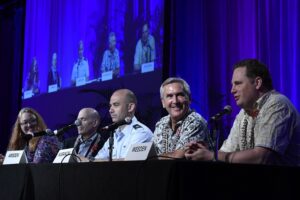
Victoria Samson (far left) guides the panel on Day 3 with (l to r) Jim Armor, Lt. Col. Kevin Amsden,Tom Kubancik and Brian Weeden,
Brian Weeden added, “On-orbit servicing and RPOs are key to enabling future of on-orbit activities. While they will greatly increase the viability of and benefits from space activities they also raise several diplomatic, legal, safety, operational, and policy challenges that need to be tackled.”
“We need to leverage best practices from government and industry to research, develop, and publish non-binding, voluntary consensus standards, both technical and operational, for cooperative RPOs,” Weeden concluded. “These standards would provide the foundation for a new commercial repertoire of robust space-based capabilities and a future in-space economy.”
The 2019 AMOS Conference, September 17-20, is expected to be even bigger as it celebrates it’s 20th Anniversary.
